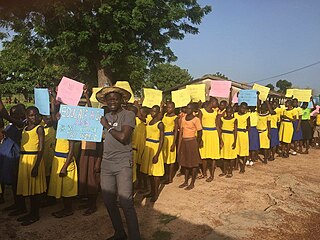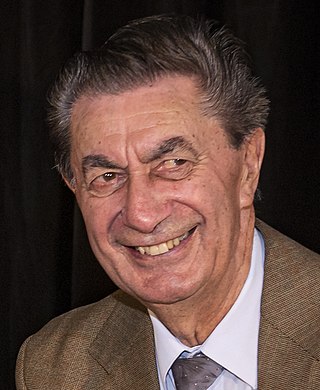
Educational psychology is the branch of psychology concerned with the scientific study of human learning. The study of learning processes, from both cognitive and behavioral perspectives, allows researchers to understand individual differences in intelligence, cognitive development, affect, motivation, self-regulation, and self-concept, as well as their role in learning. The field of educational psychology relies heavily on quantitative methods, including testing and measurement, to enhance educational activities related to instructional design, classroom management, and assessment, which serve to facilitate learning processes in various educational settings across the lifespan.

A teacher, also called a schoolteacher or formally an educator, is a person who helps students to acquire knowledge, competence, or virtue, via the practice of teaching.
Reading Recovery is a short-term intervention approach designed for English speaking children aged five or six, who are the lowest achieving in literacy after their first year of school. For instance, a child who is unable to read the simplest of books or write their own name, after a year in school, would be appropriate for a referral to a Reading Recovery program. The intervention involves intensive one-to-one lessons for 30 minutes a day with a teacher trained in the Reading Recovery method, for between 12 and 20 weeks.
In the psychology of self, one's self-concept is a collection of beliefs about oneself. Generally, self-concept embodies the answer to the question "Who am I?".
Expectancy theory proposes that an individual will behave or act in a certain way because they are motivated to select a specific behavior over others due to what they expect the result of that selected behavior will be. In essence, the motivation of the behavior selection is determined by the desirability of the outcome. However, at the core of the theory is the cognitive process of how an individual processes the different motivational elements. This is done before making the ultimate choice. The outcome is not the sole determining factor in making the decision of how to behave.
Alfred Wade Boykin is an American psychology professor known for his work in the field of education. He is a member of the faculty of Howard University. He has made contributions to the study of academic discrepancies between African American children and Caucasian children. Through his work at the Capstone Institute at Howard University he has created plans for implementations of educational reform.
In psychology, self-efficacy is an individual's belief in their capacity to act in the ways necessary to reach specific goals. The concept was originally proposed by the psychologist Albert Bandura.

Classroom management is the process teachers use to ensuring that classroom lessons run smoothly without disruptive behavior from students compromising the delivery of instruction. It includes the prevention of disruptive behavior preemptively, as well as effectively responding to it after it happens. Such disruptions may range from normal peer conflict to more severe disturbances of the social class dynamics, such as bullying among students, which make it impossible for the affected students to concentrate on their schoolwork and result in a significant deterioration of their school performance.

Clarence Edward Beeby, most commonly referred to as C.E. Beeby or simply Beeb, was a New Zealand educationalist and psychologist. He was influential in the development of the education system in New Zealand, first as a director of the New Zealand Council for Educational Research (NZCER) from 1936, and then as Director of Education from 1940, initially under the First Labour Government. He also served as ambassador to France and on the UNESCO executive.

Inclusion in education refers to all students being able to access and gain equal opportunities to education and learning. It arose in the context of special education with an individualized education program or 504 plan, and is built on the notion that it is more effective for students with special needs to have the said mixed experience for them to be more successful in social interactions leading to further success in life. The philosophy behind the implementation of the inclusion model does not prioritize, but still provides for the utilization of special classrooms and special schools for the education of students with disabilities. Inclusive education models are brought into force by educational administrators with the intention of moving away from seclusion models of special education to the fullest extent practical, the idea being that it is to the social benefit of general education students and special education students alike, with the more able students serving as peer models and those less able serving as motivation for general education students to learn empathy.

An educational psychologist is a psychologist whose differentiating functions may include diagnostic and psycho-educational assessment, psychological counseling in educational communities, community-type psycho-educational intervention, and mediation, coordination, and referral to other professionals, at all levels of the educational system. Many countries use this term to signify those who provide services to students, their teachers, and families, while other countries use this term to signify academic expertise in teaching Educational Psychology.
Patricia A. Alexander is an educational psychologist who has conducted notable research on the role of individual difference, strategic processing, and interest in students' learning. She is currently a university distinguished professor, Jean Mullan Professor of Literacy, and Distinguished Scholar/Teacher in the Department of Human Development and Quantitative Methodology in the College of Education at the University of Maryland and a visiting professor at the University of Auckland, New Zealand.

Dame Marie Mildred Clay was a researcher from New Zealand known for her work in educational literacy. She was committed to the idea that children who struggle to learn to read and write can be helped with early intervention. A clinical psychologist, she developed the Reading Recovery intervention, a whole language programme in New Zealand, and expanded it worldwide.

Angus Hikairo Macfarlane is a New Zealand academic and professor at the University of Canterbury.

Evidence-based education (EBE) is the principle that education practices should be based on the best available scientific evidence, rather than tradition, personal judgement, or other influences. Evidence-based education is related to evidence-based teaching, evidence-based learning, and school effectiveness research. For example, research has shown that spaced repetition "leads to more robust memory formation than massed training does, which involves short or no intervals".

John Allan Clinton Hattie is a New Zealand education academic. He has been a professor of education and director of the Melbourne Education Research Institute at the University of Melbourne, Australia, since March 2011. He was previously professor of education at the University of Auckland, the University of North Carolina Greensboro, and the University of Western Australia. In addition to being lauded as a leading educational expert, previously John Hattie taught both middle school and high school as a classroom teacher before entering graduate studies.
School climate refers to the quality and character of school life. It has been described as "the heart and soul of the school ... that essence of a school that leads a child, a teacher, and an administrator to love the school and to look forward to being there each school day." A positive school climate helps people feel socially, emotionally and physically safe in schools. It includes students', parents' and school personnel's norms, beliefs, relationships, teaching and learning practices, as well as organizational and structural features of the school. According to the National School Climate Council, a sustainable, positive school climate promotes students' academic and social emotional development.
Judith Margaret Parr is a New Zealand educational psychology academic. She is a full professor at the University of Auckland.

Suzanne Carolyn Purdy is a New Zealand psychology academic specialising in auditory processing and hearing loss. She is currently a full professor and head of the School of Psychology at the University of Auckland.

Viviane Marcelle Joan Robinson is an emeritus distinguished professor at the University of Auckland, specialising in organisational and educational psychology.












